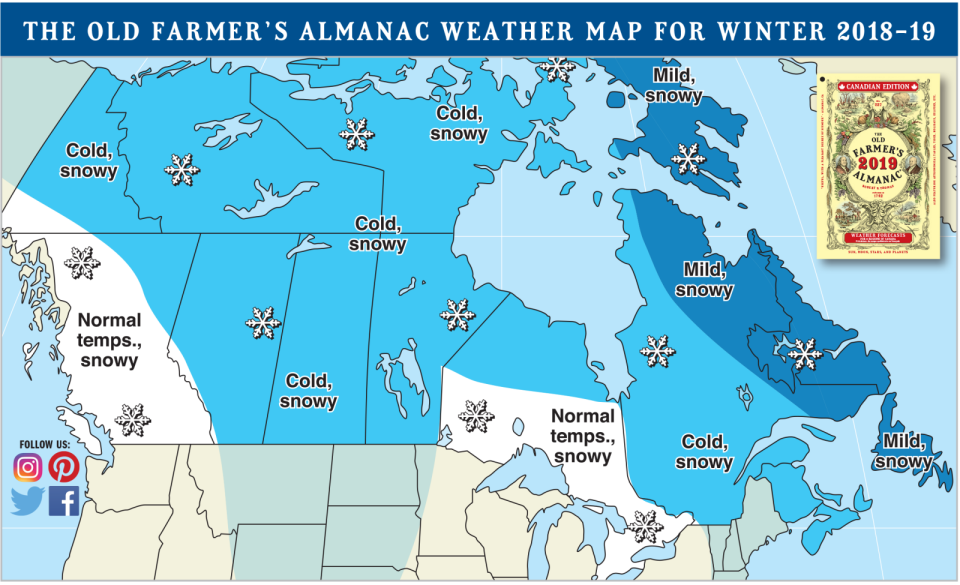Is Canada really set for a 'teeth-chattering cold' winter? Not so fast, Weather Network says

With weather forecasters like the Farmer’s Almanac and Environment Canada publicly teasing this year’s upcoming winter conditions, with seemingly drastic discrepancies, the race to put out an accurate forecast has officially started.

According to the The Old Farmer’s Almanac, Canada will experience a mostly cold winter due to a weak El Niño event in the region. The exception will be northern Atlantic Canada, which will see milder temperatures throughout the season. Western Canada and the southern two-thirds of Ontario are expected to experience temperatures within the normal range. Overall, The Old Farmer’s Almanac is predicting higher than normal snowfall for the season as well.

The slightly younger Farmer’s Almanac is predicting a cold, “teeth-chattering” winter ahead for Canada, with below-normal temperatures for much of the country. Farmer’s Almanac says the Prairies and western Ontario will see temperatures as low at -45 C in early 2019, while British Columbia will see temperatures around the normal mark throughout the season. In terms of snowfall, most of the country is expected to see average precipitation. But Farmer’s Almanac is predicting the Great Lakes region will have above-normal amounts of precipitation, while B.C. will have a “wet and/or snowy winter.”
According to Doug Gilliam, meteorologist at The Weather Network, the system Farmer’s Almanac uses to produce its seasonal forecasts is a point of curiosity for meteorologists.
“It does often lead meteorologist curious what they are looking at because I can look at a forecast from Environment Canada or from another company and while we might be different, I know why they did what they did,” Gillham said.
The Weather Network’s meteorologist describes the super El Niño event that occurred a few years ago, when the Farmer’s Almanac put out their forecast calling for a harsh winter across the country. This prediction went against the analog years The Weather Network identified for that weather pattern.
“When you have a super El Niño, history says it’s going to be a mild, or much of the country should have a mild winter,” Gillham said. “Their forecast came out calling for a harsh winter across the country well, that just showed me clearly their approach does not involve analog years and it didn’t involve the models that are readily available.”
These analog years that Gillham refers to is when meteorologists look for years in the past that have important similarities in terms of a dominant weather patterns.

Different opinions
Conversely, Environment Canada told CTV News the federal weather agency is predicting a relatively mild winter this year. Environment Canada’s senior climatologist Dave Phillips told the news outlet the El Niño event will bring a “milder than normal” winter due to warm water in the Pacific Ocean. Phillips also said the shift into winter will be gradual, with the warmer weather sticking around.
According to Gillham, often discrepancies between Environment Canada and other forecaster predictions, including The Weather Network, is the dependency on their model.
“They, essentially, exclusively depend on their model…they acknowledge that is the primary driver of their forecast,” Gillham said. “You seek to determine which model will have the best handle on the developing pattern but something that we do differently [from Environment Canada] is that we depend heavily on what are called analog years.”
“’It’s often like trying to piece a puzzle together….what are the common elements and do we have reason to believe those elements could be part of our upcoming season,” Gillham said. “I spend more time doing that than anything else in developing a winter forecast.”
‘There aren’t a lot of life decisions that…should be made over a seasonal forecast’
Gillham says although Canadians often start asking questions about the winter forecast when we approach the end of summer, we should just think of these seasonal forecasts as a “sketch” of the weather throughout that period of time.
“The most common criticism in the comments section of our seasonal forecast is either telling us that we shouldn’t be doing this or I can’t trust your winter forecast because you couldn’t tell me if it was going to rain this weekend or not,” Gillham said. “It’s Canada, and we know we’re going to have snow this winter…even if it’s a mild winter, there’s going to be periods of cold weather where you’ll need a winter coat.”
Gillham identifies that the hardest component to predict in a forecast is precipitation, which can also be the most memorable aspect of a season.
“The exact track of an individual storm is hard enough to do three to five days in advance,” Gillham said. “But getting hit by a blizzard, and if you kept that snow for a while, versus just missing the blizzard could really impact how you remember the season.”


